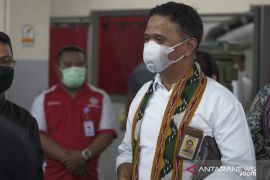"If they think transferring their funds from abroad to the country is more costly they would prefer to keep their assets abroad," Sri Mulyani said.Jakarta (ANTARA News) - Finance Minister Sri Mulyani Indrawati said repatriation is not the main option of tax payers having assets abroad.
The tax payers taking part in the tax amnesty program chose asset declaration and pay penalty if repatriation is considered less efficient , Sri Mulyani said here on Thursday.
"If they think transferring their funds from abroad to the country is more costly they would prefer to keep their assets abroad," the minister said.
The Indonesian tax amnesty program is said to be the most successful ever made by a number of countries in the world but repatriation was far short of the target of Rp1,000 trillion.
Observers said repatriation is not as easy as transferring fund from bank to bank as part of the assets stashed abroad by rich Indonesians are in shares and property
Sri Mulyani said repatriation is not the main obligation under the Tax Amnesty Law as tax payers are given the option of only declaring their assets abroad with tariff not far different from repatriation tariff.
Therefore, many participants of tax amnesty program prefer declaration over repatriation as the process is simpler for asset declaration, the minister said.
"The difference in the tariff is not significant, and the tax payers are given option," she said.
Therefore, it would better for the government to process the repatriated funds already in the country to give a significant impact on development, she said.
"Our focus is how to effectively invest the Rp143 trillion fund already repatriated with good return in the country," she added.
She said with good example in the management of the repatriated funds, found owners could be persuaded to invest their fund in the country without tax amnesty.
"This is a homework for us to show that assets brought in to the country are useful and would contribute to the countrys economic development," she said.
By Dec. 28 this year, previously not reported assets declared under the tax amnesty program , reached Rp4,155 trillion including RpRp3,012 trillion in the country, Rp1,002 trillion abroad and Rp141 trillion repatriated.
The tax amnesty program, which is made in three phases would last until March 2017. The first phase started from July to September with tax penalty of 2 percent, the second from October to December, 2016 with tax penalty of 3 percent and the third or the last from January to March 2017 with penalty of 5 percent.
After the deadline of March 2017, assets found unreported would face the law and in 2018, the country would adopt what is called Automatic Exchange of Information under which all banks in the world would be accessible to investigation of taxable assets.
At that time, there would be no safe place for tax evasion, Sri Mulyani has said.(*)
Editor: Heru Purwanto
Copyright © ANTARA 2016









